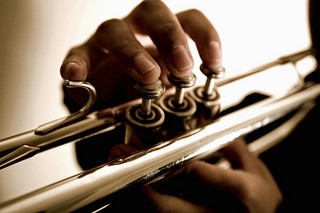 Last week I shared with you why learning to sight read music can help you with your music reading.
Last week I shared with you why learning to sight read music can help you with your music reading.
Now, it’s time for you to learn how to tackle this.
Is your throat tightening up? Is your heart starting to beat a little faster?
Don’t worry. If you know how to sight read, then the entire process is quite simple.
The key to being able to sight reading well is having a plan.
Without it, you have every reason in the world to be worried. Who needs that stress?
Tips For Sight Reading Music
To make your life a little easier, here’s a few tips you can add to your plan for better sight reading.
Tip #1 – Scan the Page
Look over the entire length of the music and take a mental note of these things:
- Time Signature.
- Key Signature.
- Check the notes. See any you don’t recognize?
- Accidentals, especially enharmonics.
- Problem solve any rhythms you don’t know right away.
- Articulation (slurs, staccatos, accents, etc.).
- Find Patterns (rhythm, articulation, or relationships between notes).
- Dynamics.
- Repeat signs and other musical directions.
- Any other music terms & symbols.
Tip #2 – Pick a Tempo
Find the most difficult rhythm in the entire piece. Count it through in your head. However fast you can play this rhythm will set the tempo for the whole song.
Tip #3 – Take a Breath
I know this sounds silly, but reminding yourself to breathe will help set you up for success. Your brain needs as much oxygen as it can possibly get right now. It’s working hard!
If you play a wind instrument, the most common problem I find with people is making the mistake of not taking a deep enough breath before even starting! You don’t want to be turning blue and falling off your chair before you can get through a few measures.
Think beyond 2, 4, or even 8 measures and take a breath that will help you get through a complete passage.
Tip #4 – Look Ahead
Don’t just focus on 1 note at a time. Expand your horizons to see the next note (or group of notes) while you are playing the first one. Keep letting your eyes look ahead to see a full measure and maybe even 2-4 measures down the road.
This lets your mind take note of what’s coming up next before you even get there.
Tip #5 – Stay Focused
Keep your mind on what you’re doing. Don’t allow yourself to pay too much attention to any other distractions. Block out people in the room, background noises, and even your own negative thoughts.
Your brain is on a mission. Let it work well for you by ignoring everything else.
Tip #6 – Go Slow
Take your time. Precision is what’s most important here. Playing fast means nothing if you can’t execute everything on the page accurately.
The purpose of sight reading is to see how much you can perform well at first glance. Don’t cheat yourself by going faster than what you can play correctly!
Tip #7 – Keep Going
This is one of the most difficult things to do. The temptation will be to go back and play some mistakes over again. Don’t do it!
Remember, this is not a practice session. This is a test to see how much you know and how well you can do it on your first try.
If you make a mistake, force yourself to let go of it right away in your head and move on. Focus on the process, not on the missed notes.
Tip #8 – Don’t Quit
No matter how frustrated you get, don’t give up. This is good for you. Think about everything you are learning right now.
By going through this process, you are collecting data on how much you know and what you need to work on. This will guide you in realizing what direction you need to go next.
Don’t allow emotion to take over. Stay objective and use this information as your compass.
Tip #9 – Start Short
If you are sight reading on your own, start with short passages. Begin with only a few measures (1-4), and build from there.
If you are sight reading in an audition, mark out the phrases in your mind and think about each passage as you go.
It’s much easier to stay focused and do your absolute best when you are working on smaller amounts at a time.
Tip #10 – Take Breaks
If you are not playing in an audition, you have the luxury of taking frequent breaks. This is not so much for your body as it is for your mind.
Thinking that hard can be very taxing. Forcing your brain to do too much for too long will extend its capacity too far and cause you to make silly mistakes.
Stopping periodically will help your mind relax and rest up for the next intense session of sight reading.
Do It Regularly
Sight reading on a regular basis will help you get better in your overall reading and playing. The more you practice, the better you get. Just make sure you are concentrating on the right things along the way (the music and not yourself).
What About You?
How do you sight read? Do you have a plan? What tips can you share?

Respected,
I eagerly want to learn. Kindly rescue me so that I can go ahead by learning more & more. Thks. With regards,
Santanu.
Hello Santanu! Be sure to check out the full site by using the search bar on the top right-hand side. Type in anything you want to learn about and a list of past articles will pop up for you to read and enjoy! Please let me know if there is anything specific you want to learn more about. Then, I can point in you in the right direction and have a better idea on how I can help you.